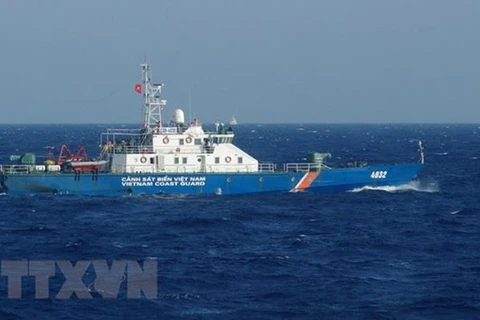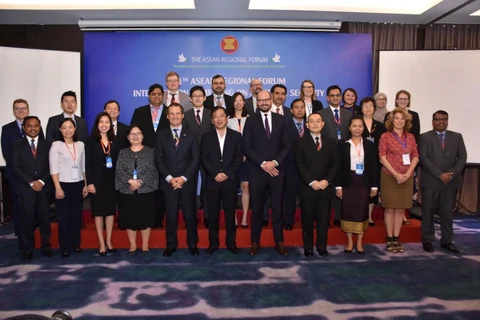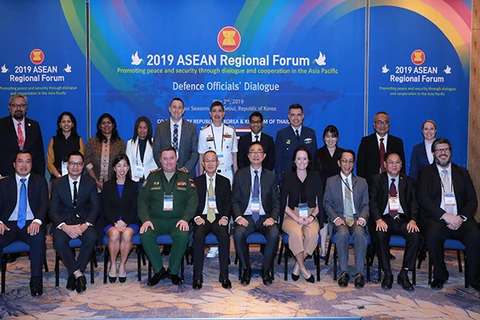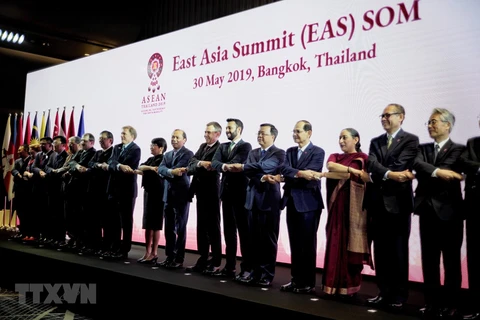Bangkok (VNA) – The Senior Officials Meeting (SOM) of the ASEAN Regional Forum (ARF) endorsed more than 20 initiatives for 2019-2020 in Bangkok on May 31.
The initiatives focused on disaster relief, fighting terrorism and trans-national crime, sea security, cyber security, denuclearization and disarmament, and peacekeeping.
The ARF SOM is part of a series of senior officials’ meetings ahead of the ASEAN Foreign Ministers’ gathering slated for August.
Participants at the event affirmed that the ARF continues to be the leading venue for talks on security cooperation in Asia-Pacific. With ASEAN at its centre, the ARF has become a main drive for trust building among countries in the region through diverse ideas on trust-building and preventive diplomacy.
The Vietnamese delegation to the SOM is led by Deputy Foreign Minister Nguyen Quoc Dung, who is head of SOM Vietnam.
Delegates discussed future orientations for the ARF and agreed to conduct a review of the forum’s activities over the past decade, while Vietnam, as Chair of the ARF in 2020, will chair the building of a vision and a plan of actions for the forum’s new development stage.
The meeting also examined a number of documents on regional security, which will be submitted to the ARF foreign ministers’ meeting in August for consideration.
Looking into international and regional situations, participating countries emphasized the significance of dialogue and cooperation as well as trust building and preventive diplomatic to the maintenance of peace and stability in the region. They underlined the importance of peace, stability, security, safety and freedom of navigation and overflight in the East Sea. Many countries took the occasion to highlight the principles of self-restraint, peaceful settlement of disputes and respect for international law, including the 1982 UN Convention on the Law of the Sea (1982 UNCLOS).
The countries acknowledged the progress that ASEAN and China have made in implementing the Declaration on the Conduct of Parties in the East Sea (DOC), and expressed their hope that the two sides early reach a substantive and effective Code of Conduct of Parties (COC) in the East Sea.
Regarding the Korean peninsula, the meeting welcomed the parties’ commitment to maintaining dialogue and seeking a comprehensive solution to issues in this area. The countries urged related parties to make their utmost efforts to promote the full implementation of reached agreements for long-term peace, stability and security in a Korean peninsula without nuclear weapons.
Addressing the meeting, the Vietnamese head delegate underlined the importance of ASEAN-led mechanisms in forming an open, inclusive and rule-based regional structure, as well as of dialogue, cooperation, trust building measures and the observance of international law in the context of increasing complicated and diversified challenges.
Vietnam also welcomed the outcomes of the negotiations on the COC between ASEAN and China while noting concerns about developments that can undermine trust and negatively affect the peaceful and stable environment in the region. In such context, countries should restrain themselves, avoid unilateral actions that can undermine trust, refrain from militarization, abide by international law and the UNCLOS, and settle disputes through peaceful measures so as to maintain a favourable environment for the COC negotiation, the Vietnamese head delegate said at the meeting.
The ARF has 27 members, comprising all 10 ASEAN members and Australia, Bangladesh, Canada, China, the EU, India, Japan, Democratic People’s Republic of Korea, the Republic of Korea, Mongolia, New Zealand, Pakistan, Papua New Guinea, Russia, Timor Leste, the United States, and Sri Lanka. -VNA
VNA
























